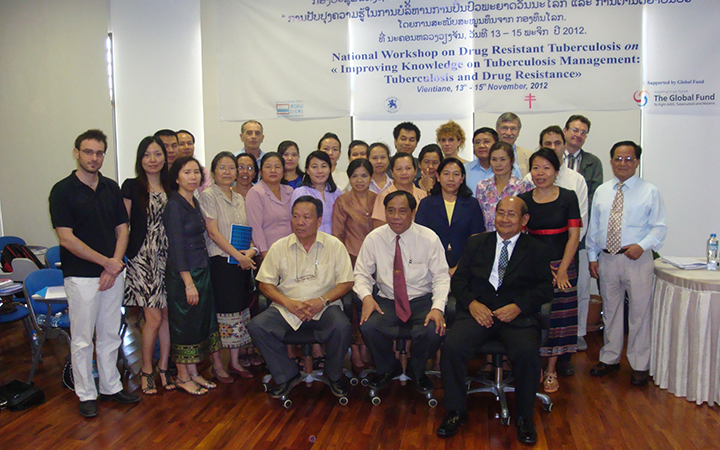
From 2012 November 13th to 15th, the first Lao National Workshop on tuberculosis (TB) took place in Centre d’Infectiologie Christophe Mérieux du Laos (CICML).
Thanks to its conference room, CICML has hosted workshops and meetings since its opening in 2009. CILM is also involved in tuberculosis identification and drug resistance characterization as it is the only location where the Nucleic Acid Amplification test is performed in Laos.
The theme of this first workshop on TB was Drug Resistant Tuberculosis (DR TB). During the three days of talks, participants attended presentations, workshops and discussed focused issues with a panel of experts from France and from the South East Asia region.
The purpose was to review basic epidemiology, microbiology and knowledge on DR TB emergence and programmatic priorities on prevention and cases management in Laos. CICML staff and Fondation Mérieux organized this workshop with support from National Tuberculosis Center and Ministry of Health and Global Fund. About 70 participants attended this meeting during the three days.
People came from every province of Lao PDR. They were provincial tuberculosis managers and clinical practitioners treating patients infected with tuberculosis. Technical staffs and physicians from Settatirath hospital were also invited, as MDR patients are managed there.
Greetings and opening ceremony were given by Dr Sisavath Soutthaniraxay (Deputy Director of Communicable Diseases Control Department) and Pr Phanasin Sylavanh (Director of National Tuberculosis Center).
As an introduction, mechanisms of resistance were reviewed including mainly: selection of spontaneous drug resistant mutants in a bacterial population under inappropriate treatment. Then, orators presented the TB burden estimation in Lao PDR using the results of the 2010-2011 national prevalence survey. Follow up of notified Multi-Drug Resistant (MDR) cases was also described. Since July 2011, when the first MDR in the country was diagnosed, thirteen patients are now on follow up in dedicated MDR units and 8 have died or were lost to follow up. Specific regimens that constitute second line treatments were discussed.
New molecular tools were described several times in the meeting. Molecular epidemiology allows for a better understanding of outbreaks. It could result in more rapidly interrupting the chain of transmission of virulent strains and to trace MDR strains diffusion. In addition, investigation of the contacts around a case and Isoniazid Preventive Treatment delivery were noted as key points for disease control.
Then, during a workshop session, 4 groups led by a facilitator discussed issues reported from the field regarding the four following topics: Screening for MDR TB, DOTS (Directly Observed Treatment, Short-course) access, Infection Control; and, Tuberculosis in Children.
Intense discussions with the audience during the sessions highlight the pedagogic challenge and future needs for Lao PDR. Indeed, the country is facing the risk of new and emerging epidemic with multi drug resistant Tuberculosis as other countries have already experienced. With this human-caused phenomena (drug resistance), medical education on tuberculosis management is a key factor.
As highlighted during this workshop, TB prevalence ranks Lao PDR as a high burden country. Resistant strains have been identified since implementation of laboratory capacities at CICML. To date, number of MDR-TB cases is low: there were 13 cases diagnosed for the last 18 months. As alimited-resource country Lao PDR faces different challenges, thus all components of the fight have to be enhanced in order to reach the target 6C of the Millenium Development Goals by 2015.
